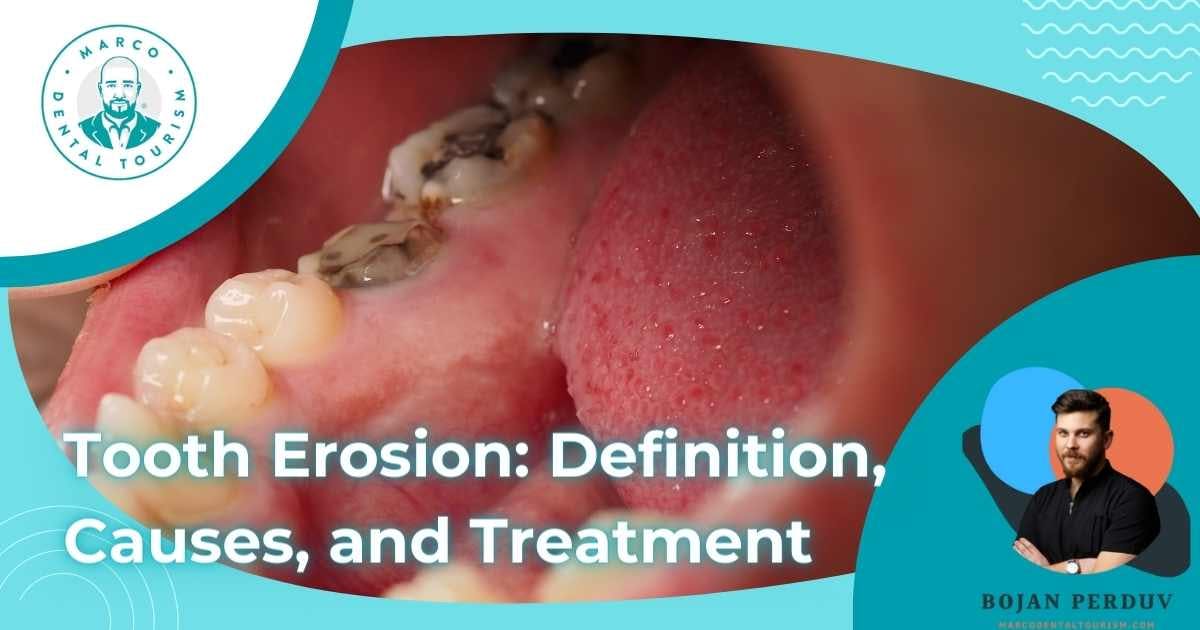Tooth Erosion: Definition, Causes, and Treatment



If you've ever felt an intense stab of pain when you drink something cold or bite into something hard, you may have early symptoms of tooth erosion. In order to avoid complications, timely recognition and treatment are important. In this article, we deal with the causes, symptoms, and treatments of dental erosion.

Tooth erosion is the loss of tooth structure as a result of the chemical dissolution of tooth enamel by acids that are not of bacterial origin. Acids can come from the food and drinks we eat or from stomach acid. When the enamel is eroded, sensitivity, tooth decay, and other dental problems occur.
Tooth erosion is caused by acidic substances that wear down tooth enamel. Heartburn can result from frequent consumption of acidic foods and drinks such as citrus fruits, soft drinks, and fruit juices. Erosion is also caused by brushing too hard with a hard-bristled brush, dry mouth, and bruxism.

Dental erosion can be recognized by the yellowish or transparent appearance of the teeth due to the loss of tooth enamel. You may also see small holes or cracks in the teeth. Tooth erosion can also cause tooth sensitivity to heat, cold, or sweets. In more severe cases, the tooth may take on a rounded shape.

To prevent tooth erosion, avoid carbonated drinks, sweet and sour snacks. Drink plenty of water to neutralize the acid in your mouth, use a soft-bristled brush, use fluoride toothpaste, and consider using a mouthguard if you have a problem with grinding your teeth.
In addition, as the best prevention against tooth erosion, we recommend:

Treatment of erosion depends on the severity of the damage. In mild cases, changes in diet and oral hygiene are sufficient to slow or stop further erosion. In case of greater damage, in order to restore the tooth to its shape and function, veneers or crowns may be necessary, while in severe forms extraction is necessary.
The most common forms of tooth erosion treatment include:
Wedge erosion is a type of tooth erosion that occurs where the gums and teeth meet. It is characterized by a V-shaped notch that forms on the surface of the tooth, usually on the premolars or molars, and is caused by various factors such as acidic foods and drinks, toothbrush abrasion, and bruxism.

When it comes to wedge erosion, choose a paste that is gentle on the teeth and will not further damage the enamel. Look for a toothpaste that is specially formulated for sensitive teeth and contains fluoride to strengthen the enamel. Avoid highly abrasive or acidic agents that can worsen erosion.
In short, tooth erosion is a serious problem that can lead to many uncomfortable complications. On the other hand, with proper care, prevention and treatment, it is possible to avoid all negative consequences and improve your oral health. So take care of your teeth, schedule regular check-ups and enjoy your Hollywood smile!

Schedule a consultation, and Marco will get back to you as soon as possible!
Share your opinion!
What do you think about this topic?
Comments (0)